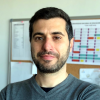Webinars series
 Registration |
Beyza Ermiş (Cohere Labs) TBA (Thursday, June 4, 2026 - 15:00 CET) |
 Registration |
Barbara Plank (Ludwig-Maximilians-Universität München (LMU)) TBA (Thursday, May 7, 2026 - 15:00 CET) |
 Registration |
Ranjay Krishna (University of Washington) TBA (Thursday, April 16, 2026 - 15:00 CET) |
 Registration |
José Andrés González López (Universidad de Granada) TBA (Thursday, March 5, 2026 - 15:00 CET) |
 Registration |
Henning Wachsmuth (Leibniz University Hannover) TBA (Thursday, February 5, 2026 - 15:00 CET) |
 Registration |
Thamar Solorio (Mohamed bin Zayed University of Artificial Intelligence (MBZUAI)) TBA (Thursday, January 15, 2026 - 15:00 CET) |
 Registration |
Goran Glavaš (Universität Würzburg) Improving Multilingual Abilities of (Different Types of) Language Models (Thursday, December 4, 2025 - 15:00 CET) |
 Registration |
Ivan Vulić (University of Cambridge / Google DeepMind) |
 Registration |
Jose Camacho-Collados (Cardiff University) |
 Registration |
Mirella Lapata (The University of Edinburgh) |
 Registration |
Sampo Pyysalo (University of Turku) |
 Registration |
André F. T. Martins (Universidade de Lisboa) |
 Registration |
Emanuele Bugliarello (Google DeepMind) |
 Registration |
Christian Herff (Maastricht University) |
 Registration |
Sebastian Ruder (Meta) |
 Registration |
Ekaterina Shutova (University of Amsterdam) Canceled. Comming soon Cross-lingual information sharing in multilingual language models (Thursday, January 30, 2025 - 15:00 CET) |
 Registration |
Javier de la Rosa (Artificial Intelligence Lab (National Library of Norway)) |
 Registration |
Elena Sokolova (Amazon Text-to-Speech Group) No recording available for this webinar How we do research in Speech at Amazon (Thursday, November 7, 2024 - 15:00 CET) |
 Registration |
Marco Baroni (Universitat Pompeu Fabra) |
 Registration |
Smaranda Muresan (Columbia University) |
 Registration |
Heng Ji (University of Illinois) |
 Registration |
Emily M. Bender (University of Washington) |
 |
Pascale Fung (The Hong Kong University of Science and Technology) |
 |
Martin Cooke (Ikerbasque – Basque Foundation for Science) |
 |
Isabelle Augenstein (University of Copenhagen) |
 |
Thomas Hueber (CNRS/GIPSA-lab) |
 |
Maarit Koponen (University of Eastern Finland) |
 |
Vered Shwartz (The University of British Columbia-Vancouver) |
 |
Xiang Ren (University of Southern California - USC) |
 |
Mikel Artetxe (FAIR (Meta AI)) |
|
|
Sakriani Sakti (Japan Advanced Institute of Science and Technology) |
 |
Dan Roth (University of Pennsylvania) |
 |
Desmond Elliott (University of Copenhagen) |
 |
Roger Moore (The University of Sheffield) |
 |
Odette Scharenborg (Delft University of Technology) |
 |
Sam Bowman (New York University) |
 |
Hinrich Schuetze (University of Munich) |
 |
Heidi Christensen (University of Sheffield, UK) |
|
|
Jose Luis Alba Castro - Carmen García Mateo (University of Vigo) |
 |
Iryna Gurevych (Technische Universität Darmstadt) |
 |
Ricardo Baeza-Yates (Northeastern University) |
 |
Kyunghyun Cho (NYU) |
 |
Eduard Hovy (CMU) |




